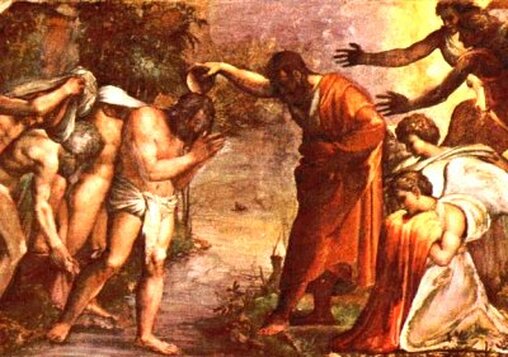Matthew 3:1-17
Lesson 4
Lesson 4
Read both the "King James Bible" and the "New Living Translation."
In this lesson:
Years have passed since chapter two.
In the last lesson, Jesus was a boy; now He's ready to begin His ministry.
Starting with this lesson and running through verse 4:11
(lesson five), we see John the Baptist preparing the way for Jesus.
Jesus' baptism in the Jordan
River at the hand of John the Baptist.
By Italian High Renaissance painter and architect Raphael Sanzio da Urbino (1483-1520)
River at the hand of John the Baptist.
By Italian High Renaissance painter and architect Raphael Sanzio da Urbino (1483-1520)
Study Tip:
Ask yourself;
What does each passage teach me?
Does it have a commandment for me to follow?
What difference could it make in my life?
Ask yourself;
What does each passage teach me?
Does it have a commandment for me to follow?
What difference could it make in my life?
Who were the -
Pharisees -
Pharisee is a Hebrew word meaning "the separated ones." The Pharisees were one of four Jewish religious sects, along with the Sadducees, Zealots, and Essenes. The first Pharisees (originally called Chasidim) made it their mission to keep the Mosaic Law alive in the Jews who returned to Jerusalem from Babylonian captivity. Many returnees had lost the meaning of Judaism after 70 years of servitude in Babylon. Although they had a noble beginning, by Jesus' time, the Pharisees had devolved into a legalistic party of self-righteous religious leaders who looked down on others (Luke 18:9) and avoided anything that wasn't Jewish. They fasted twice a week (Luke 18:10-12) and believed they were more devout than other Jews. Yet, few Pharisees were genuinely religious. The Pharisees were a dominant force in Jewish society who strictly, but often hypocritically, followed the Law of Moses (the Torah) and the "tradition of the elders" (Matthew 15:2). All religious ceremonies, prayers, and sacrifices were performed according to their decrees. Pharisees believed in God, the authority of the Scriptures, the resurrection of the dead (Daniel 12:2), angels, and spirits (Acts 23:8). But they placed their own rules above God's. They continually added more and more burdensome dictates on their followers to the point where true faith was lost. The Pharisees were good at spinning the truth and finding fault in others. They anticipated the Messiah's arrival but expected him to be a great military/political leader. The Pharisees were so caught up in following the minute details of Jewish law that they didn't recognize Jesus as the Messiah they had been waiting for. They refused to accept Jesus even though they knew He performed miracles" (John 11:47) and witnessed some firsthand (Matthew 12:9-14; 21:14-15; Mark 3:1-6; Luke 5:24-26; 6:6-11; Luke 14:2-4). Jesus called them hypocrites on many occasions
(Matthew 15:7-8; 22:18; 23:23-35; Luke 12:1). Their jealousy, pride, and anger towards Jesus turned to hatred, and their hatred led them to call for the crucifixion of the very Messiah they had been waiting on. To rid themselves of Jesus, the anti-Roman Pharisees even "took counsel" with their bitter foes and pro-Roman Herodians (Mark 3:6). In Jesus' time, there were approximately six thousand Pharisees in Palestine.
Sadducees -
One of four Jewish sects (along with the Pharisees, Zealots, and the Essenes). Mostly well-educated, upper-class, and aristocratic, the Sadducees wielded considerable political power thanks to their wealth. Although smaller in number than the Pharisees, they were more worldly and held a majority of the seats in the council of elders (the Sanhedrin). The Sadducees rejected the traditions of the Pharisees and only believed in the first five books of the Old Testament (the Pentateuch). Unlike the Pharisees, they thought that souls died with the person and denied such things as the resurrection of the body (Matthew 22:23; Mark 12:18; Luke 20:27), eternal punishment or reward, and the existence of angels, demons, and spirits (Acts 23:8). They openly mocked the Pharisees and their burdensome rules. The Sadducees repeatedly sacrificed their religious beliefs to curry favor with the Roman occupiers. The Sadducees and Pharisees distrusted each other but came together to plot against Jesus (Matthew 22:34). The Sadducees vanished forever when the Roman army destroyed Jerusalem in AD 70.
Pharisees -
Pharisee is a Hebrew word meaning "the separated ones." The Pharisees were one of four Jewish religious sects, along with the Sadducees, Zealots, and Essenes. The first Pharisees (originally called Chasidim) made it their mission to keep the Mosaic Law alive in the Jews who returned to Jerusalem from Babylonian captivity. Many returnees had lost the meaning of Judaism after 70 years of servitude in Babylon. Although they had a noble beginning, by Jesus' time, the Pharisees had devolved into a legalistic party of self-righteous religious leaders who looked down on others (Luke 18:9) and avoided anything that wasn't Jewish. They fasted twice a week (Luke 18:10-12) and believed they were more devout than other Jews. Yet, few Pharisees were genuinely religious. The Pharisees were a dominant force in Jewish society who strictly, but often hypocritically, followed the Law of Moses (the Torah) and the "tradition of the elders" (Matthew 15:2). All religious ceremonies, prayers, and sacrifices were performed according to their decrees. Pharisees believed in God, the authority of the Scriptures, the resurrection of the dead (Daniel 12:2), angels, and spirits (Acts 23:8). But they placed their own rules above God's. They continually added more and more burdensome dictates on their followers to the point where true faith was lost. The Pharisees were good at spinning the truth and finding fault in others. They anticipated the Messiah's arrival but expected him to be a great military/political leader. The Pharisees were so caught up in following the minute details of Jewish law that they didn't recognize Jesus as the Messiah they had been waiting for. They refused to accept Jesus even though they knew He performed miracles" (John 11:47) and witnessed some firsthand (Matthew 12:9-14; 21:14-15; Mark 3:1-6; Luke 5:24-26; 6:6-11; Luke 14:2-4). Jesus called them hypocrites on many occasions
(Matthew 15:7-8; 22:18; 23:23-35; Luke 12:1). Their jealousy, pride, and anger towards Jesus turned to hatred, and their hatred led them to call for the crucifixion of the very Messiah they had been waiting on. To rid themselves of Jesus, the anti-Roman Pharisees even "took counsel" with their bitter foes and pro-Roman Herodians (Mark 3:6). In Jesus' time, there were approximately six thousand Pharisees in Palestine.
Sadducees -
One of four Jewish sects (along with the Pharisees, Zealots, and the Essenes). Mostly well-educated, upper-class, and aristocratic, the Sadducees wielded considerable political power thanks to their wealth. Although smaller in number than the Pharisees, they were more worldly and held a majority of the seats in the council of elders (the Sanhedrin). The Sadducees rejected the traditions of the Pharisees and only believed in the first five books of the Old Testament (the Pentateuch). Unlike the Pharisees, they thought that souls died with the person and denied such things as the resurrection of the body (Matthew 22:23; Mark 12:18; Luke 20:27), eternal punishment or reward, and the existence of angels, demons, and spirits (Acts 23:8). They openly mocked the Pharisees and their burdensome rules. The Sadducees repeatedly sacrificed their religious beliefs to curry favor with the Roman occupiers. The Sadducees and Pharisees distrusted each other but came together to plot against Jesus (Matthew 22:34). The Sadducees vanished forever when the Roman army destroyed Jerusalem in AD 70.




